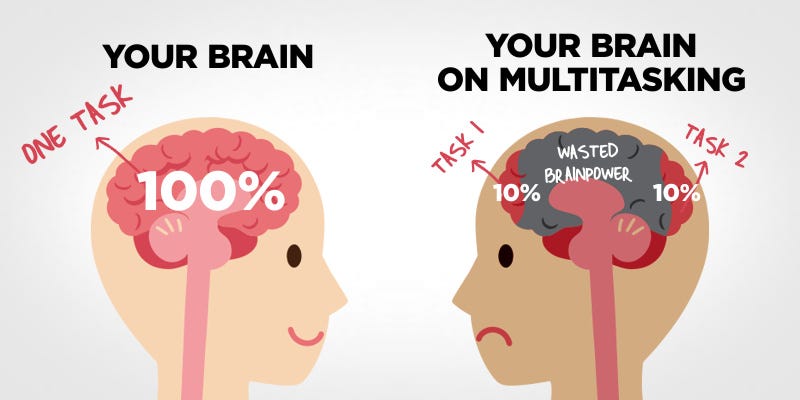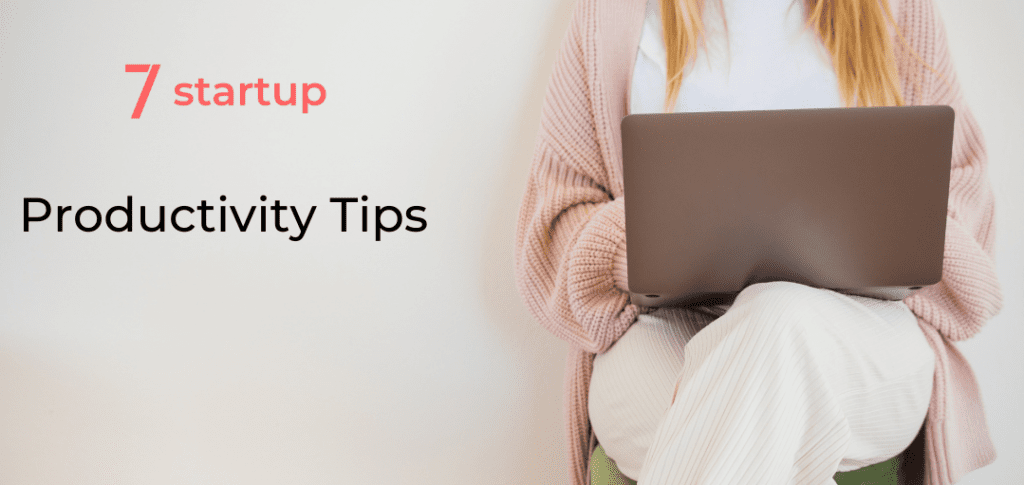Do you frequently get caught up in a downward spiral during the workday? You have a bunch of things you want to accomplish every day as you wake up, but before long you find yourself getting sidetracked, concentrating on low-importance chores, or just procrastinating. What steps can you take to reclaim your power over time? In this article we will not only go over the physical actions you can take to help boost your productivity, but also the changes in the way you think, and ways you can prepare or organise ahead of time that can have the same positive effect.
Actions to Increase Productivity
Quit Trying to Multitask 
Despite what most people may think, neuroscientists have declared multitasking to not be humanly possible. While you might feel as though you’re working hard when working on a multitude of tasks, it’s likely you aren’t giving any of them the proper attention they deserve, which will lead to more mistakes.
There is a cognitive capacity limit to how many ideas and memories each of us can hold simultaneously. Your brain may deceive itself into believing that it has more capacity than it actually has, but when you are switching between tasks, your brain is actually working harder to process several thoughts at once. How well you can concentrate on one task at a time, whether it takes five minutes or an hour, determines how much you can do.
You typically make more errors when attempting to multitask. The neural networks in your brain must go back and figure out where they left off and then rearrange when you switch between tasks. You slow down as a result of the additional activity, which increases your risk of making mistakes.
Attempting to multitask also hampers creativity. When we allow our minds to travel down a logical chain of related ideas and thoughts, true innovation can emerge. This is more likely to happen when we can maintain sustained mental focus. Overall, attempting to multitask will reduce your productivity.
Take Breaks 
This one can also help with trying not to multitask. If it’s hard for you to focus on one thing for extended periods of time, try setting a timer for 10 minutes of distraction-free work, then taking a minute off to allow the distractions in. This can make mono-tasking substantially less daunting. Whether you can focus on a singular task for only 10 minutes at a time, or multiple hours at a time, everybody has their limit.
No matter how busy you are, the law of diminishing returns eventually sets in, and physical and/or mental exhaustion begins to reduce your performance. Even on the busiest days, the schedule will occasionally break. Stand up, stretch, get a sip of water, and walk around the block for 10 minutes. Both psychologically and physically renewed, you’ll be prepared to be even more productive when you get back to work.
Productivity strategies like the Pomodoro Method involve having regular intervals of focused work and downtime or breaks. The Pomodoro Method uses a timer to break your day into 25 minute intervals of working, followed by 5 minute breaks. Some people aren’t a fan of this method however, as you can’t always predict when you will need a break, or when you will want to keep working. If you get to know yourself and work habits thoroughly, it shouldn’t be hard to figure out your body’s own signs of saying it needs a break. Just be sure to get back to work before too long.
Thoughts to Increase Productivity
Understand Your Personal Work Patterns
Some people are at their sharpest early in the morning, and slow down as the day goes on. Others can take awhile to get going at the start of their day, and may not hit their full stride until it’s dark out. While most people are likely to fall between those two extremes, everybody has their time of the day where they’re likely to be at their most focused. Pinpointing when this time is can be extremely beneficial in terms of productivity.
If you work from 9-5 but your creative peak is from 6-8 (AM or PM), then you’re not properly utilising your personal work patterns for your job as best you could. However with modern business environments changing, accommodations for this may not be out of the question. If something requires deep or analytical thinking, doing it during your sweet spot could drastically improve not only the speed of the task, but the quality of the outcome as well.
Additionally, keeping track of your personal work patterns is not only a good way of identifying when you are working your best, but identifying things that slow you down or impede on your productivity. Like was said earlier, understanding when you could benefit from a short break is far more beneficial than trying to power through when you’re burnt out.
Knowing your tech habits, such as how frequently you check your favourite websites or social media, when you check your email, can help you manage your time more effectively. You might be able to accomplish more if you rearrange some of those things to better suit your day and work patterns. You can see where you spend your time by keeping track of it for a few days, which will enable you to more accurately estimate your goals from #1 the following time. You’ll be able to estimate the required time more accurately the next time you’re asked to perform the same work.

Speak to Yourself Differently
Productive people think in very different ways than others. You must challenge your thoughts and cultivate a productive mindset. A productive person avoids dwelling on all the things they won’t be able to do because of this or that.
Instead, they think things like:
- I have to do X,Y, and Z. What is the most efficient way for me to complete all of my tasks?
- What is causing this stress, and what needs to change for me to get a better grip over this situation?
- Given the current situation, what could I do to improve this?
The words and phrases you use when speaking to yourself either make you feel better or worse. If you’re not sure where to begin, use positive affirmations as a form of positive self-talk.
The words you use to speak to yourself are crucial in all aspects of life. These serve as your guide, whether they support you or not. Being more productive will become much easier when your words lift you up rather than tear you down.
It’s also important to forgive yourself if you’re struggling with something or make a mistake. You’re only human and this happens to everyone, as well as having bad days. Moving on and learning from them is far more important and beneficial than dwelling on them.
As well as not being too hard on yourself, it is also important to celebrate your wins, no matter how small. When you do something good or productive, you deserve a pat on the back, even if it’s from yourself. And even though it’s from yourself, the dopamine released into your brain will motivate you even further to keep working.
Organisation & Preparation to Increase Productivity
To-Do Lists 
The major key with this is to not allow your to-do list to overwhelm you. Otherwise, it’s actually causing more harm than good. Other reasons a to-do list could fail are if the tasks on it are too complex or vary too much in difficulty. If some tasks are easy, and other more difficult ones are going to take significantly longer, then it can actually aid in your procrastination. If this is unavoidable however, then it’s important to eat the frog, or to do the most difficult tasks first to get them out of the way. It’s also important that the tasks on your to-do list are specific. Vague to-do lists leave people less inclined to get started on what they need to do.
While there are things about to-do lists that can put off some people, there is a reason they are mentioned on every single “Productivity Tips” list you’ll find online, they help. Having every task that you need to get done written down in one spot saves you from having to try to remember all of them, and likely forgetting some. Additionally, planning out the order in which you are going to do tasks can save you from having to spend time deciding what to do next after each one is done.
Additionally, as mentioned earlier, one must celebrate the small wins, and having a to-do list gives you as many small wins as you want throughout the day. And again, every time you check off a task from your to-do list, dopamine releases into your brain, improving your mood and giving you more motivation for further tasks.
Group Similar Tasks Together 
We naturally create friction when we switch between tasks. Every time you finish something or are going to start something it’s there. All of those small moments add up and disrupt our focus. Then we become distracted and forget why we were reviewing something in the first place. To reduce switching between tasks, group similar ones together. Don’t respond to just one email and then move on. Respond to all of them and then leave for several hours. Alternatively, group all of your emails together. Overall, you will save time by grouping similar tasks and notice the difference in momentum loss.
Good Luck!
Good luck with increasing your productivity! While it is unrealistic to expect to change years of working habits overnight, small changes can add up to big changes in productivity over time. Start with one change and gradually add more as you get comfortable with new strategies and discover which ones work best for you. Another important thing for maximising your productivity is your mindset. Read more about how a growth mindset can help you! Only you can figure out how to maximise your own productivity, but you have to take it one step at a time.

Amit Khanna, 7startup Founder
Amit has 18 years of experience in the industry and an MBA. He supports entrepreneurs with every aspect of their business including concept and product development, investor presentations, and fundraising. Amit & 7startup assist startups in the pre due-diligence process and help connect them to our vast network of investors. Reach out to us today and see if we’re a fit!
If you enjoyed this blog post and want to read another list of our top tips, you’re in luck! Check out Tech Startup Advice – 7 Top Tips for Ambitious Tech Startups to keep on learning.








